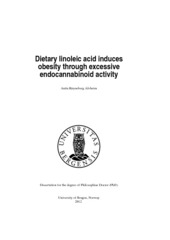| dc.contributor.author | Alvheim, Anita Røyneberg | en_US |
| dc.date.accessioned | 2012-08-20T13:32:23Z | |
| dc.date.available | 2012-08-20T13:32:23Z | |
| dc.date.issued | 2012-03-23 | eng |
| dc.identifier.isbn | 978-82-308-1999-9 | en_US |
| dc.identifier.uri | https://hdl.handle.net/1956/5962 | |
| dc.description.abstract | Background: Dietary intakes of the n-6 fatty acid linoleic acid (LA, 18:2n-6) have increased dramatically during the 20th century. Replacing fish oil (FO) with vegetable oil (VO) in feed for farmed fish introduces LA and alters the fatty acid composition in Atlantic salmon (Salmo salar L.). LA is the precursor of arachidonic acid (AA, 20:4n-6) the backbone of the endocannabinoids 2-arachidonoylglycerol (2-AG) and anandamide (AEA). A sustained hyperactivity of the endocannabinoid system is believed to play a causal role in the development of obesity and associated metabolic disorders. Here we posit that excessive dietary intake of LA, the precursor of AA, would induce endocannabinoid hyperactivity and promote obesity. Design: LA was isolated as an independent variable to reflect the dietary increase in LA from 1 percent of energy (en%) to 8 en% occurring in the US during the 20th century. Male C57BL/6j mice were exposed to 1 en% LA and 8 en% LA in diets of 35 en% and 60 en% fat from last week of gestation and 14 weeks from weaning (Paper I), and in diets of 12.5 en% and 35 en% fat for 16 weeks from 6 weeks of age (Paper II). To reduce tissue n-6 highly unsaturated fatty acids (HUFA), 1 en% eicosapentaenoic acid (EPA, 20:5n-3)/docosahexaenoic acid (DHA, 22:6n-3) were supplemented to the 8 en% LA diets in Paper I. Atlantic salmon, 340 g, was fed fish oil and soybean oil (SO) for 6 months. Male C57BL76j mice, 6 weeks of age, were fed diets of 35 en% fat based on FO salmon fillet (1 en% LA) and SO salmon fillet (8 en% LA) for 16 weeks (Paper III). Results: Increasing dietary LA from 1 en% to 8 en% elevated AA in phospholipids (AA -PL) with a subsequent elevation in liver 2-AG and anandamide associated with higher food intake, feed efficiency, weight gain and adiposity and increased hypertrophy and inflammation of adipose tissue. Selectively reducing LA to 1 en% reversed the obesogenic properties of a high fat diet. Reducing AA -PL by EPA/DHA supplementation resulted in metabolic patterns resembling 1 en% LA diets. Replacing fish oil with soybean oil in feed for Atlantic salmon elevated tissue LA and AA, and increased endocannabinoid activity and lipid accumulation in salmon liver. Mice fed SO salmon gained more weight, had larger adipocytes and more adipose tissue inflammation than mice fed FO salmon. Conclusion: Dietary LA of 8 en% LA induces hyperactivity of the endocannabinoid system and increase the risk of developing obesity and associated metabolic disorders in mice. In a balanced diet, the adipogenic effect of LA can be prevented by consuming sufficient EPA and DHA to reduce the AA -PL pool and normalize endocannabinoid tone. A dietary approach addressing an underlying cause of endocannabinoid hyperactivity may prove to be a safe and viable alternative for preventing and decreasing obesity. | en_US |
| dc.language.iso | eng | eng |
| dc.publisher | The University of Bergen | eng |
| dc.relation.haspart | Paper I: Anita R. Alvheim, Marian K. Malde, Douglas Osei-Hyiaman, Yuhong Lin, Robert Pawlosky, Lise Madsen, Karsten Kristiansen, Livar Frøyland, Joseph R. Hibbeln. Dietary linoleic acid elevates endogenous 2- AG and anandamide and induces obesity. Obesity e-print ahead of paper, 2012. Full text not available in BORA due to publisher restrictions. The article is available at: <a href="http://dx.doi.org/10.1038/oby.2012.38" target="blank"> http://dx.doi.org/10.1038/oby.2012.38</a> | en_US |
| dc.relation.haspart | Paper II: Anita R. Alvheim, Bente E. Torstensen, Yu Hong Lin, Haldis H. Lillefosse, Erik-Jan Lock, Lise Madsen, Livar Frøyland, Joseph R. Hibbeln, Marian K. Malde. Dietary linoleic acid elevates the endocannabinoids 2-AG and AEA, and induces weight gain and inflammation in mice fed a low fat diet. Full text not available in BORA. | en_US |
| dc.relation.haspart | Paper III: Anita R. Alvheim, Bente E. Torstensen, Yu Hong Lin, Haldis H. Lillefosse, Erik-Jan Lock, Lise Madsen, Joseph R. Hibbeln and Marian K. Malde. Dietary linoleic acid elevates endogenous 2-AG and andandamide in Atlantic salmon (Salmo salar L.) and mice, and induces weight gain and inflammation in mice. Full text not available in BORA. | en_US |
| dc.title | Dietary linoleic acid induces obesity through excessive endocannabinoid activity | en_US |
| dc.type | Doctoral thesis | |
| dc.rights.holder | Copyright the author. All rights reserved | |
| dc.subject.nsi | VDP::Medical disciplines: 700::Health sciences: 800::Nutrition: 811 | eng |
